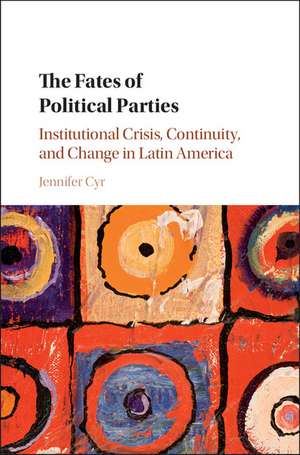The Fates of Political Parties: Institutional Crisis, Continuity, and Change in Latin America
Autor Jennifer Cyren Limba Engleză Hardback – 8 iun 2017
Preț: 517.39 lei
Preț vechi: 689.03 lei
-25% Nou
Puncte Express: 776
Preț estimativ în valută:
99.02€ • 102.99$ • 81.74£
99.02€ • 102.99$ • 81.74£
Carte indisponibilă temporar
Doresc să fiu notificat când acest titlu va fi disponibil:
Se trimite...
Preluare comenzi: 021 569.72.76
Specificații
ISBN-13: 9781107189799
ISBN-10: 1107189799
Pagini: 280
Ilustrații: 10 b/w illus. 28 tables
Dimensiuni: 158 x 235 x 20 mm
Greutate: 0.52 kg
Editura: Cambridge University Press
Colecția Cambridge University Press
Locul publicării:New York, United States
ISBN-10: 1107189799
Pagini: 280
Ilustrații: 10 b/w illus. 28 tables
Dimensiuni: 158 x 235 x 20 mm
Greutate: 0.52 kg
Editura: Cambridge University Press
Colecția Cambridge University Press
Locul publicării:New York, United States
Cuprins
1. Introduction; 2. Political parties and their resources; 3. Explaining the fates of parties; 4. The resource wealth of parties after party-system collapse: the empirical record in the Andes; 5. Survival and revival in an atomized party system: Peru after 1992; 6. Survival and revival in a regionalized party system: Venezuela after 1998; 7. The difficulties of survival and revival in a hyper-fluid party system: Bolivia after 2005; 8. Conclusion: resources and the fates of parties.
Recenzii
'Why do some established parties survive or reinvent themselves while other parties disappear when party systems collapse? The Fates of Political Parties provides a compelling explanation to this important but understudied question. Jennifer Cyr carefully shows how high-cost organizational and ideational resources, such as party branches, militants, ideologies, and brands, shape the destiny of parties in crisis contexts. Rigorously argued and exhaustively researched, this book should be the starting point for future research on party survival. It is essential reading not only for scholars specializing in Latin American politics, but for anyone interested in understanding why some parties persist.' Raúl L. Madrid, University of Texas, Austin
'The Fates of Political Parties is an impressive and highly topical study of what happens to parties when a party system enters crisis. It is strongly recommended for readers interested in party survival, and the politics of the Andes generally. The book provides compelling evidence for the importance of subnational politics, the power of ideas, and the capacities of parties to reinvent themselves. An essential contribution to the literature.' Maxwell A. Cameron, Director, Centre for the Study of Democratic Institutions, University of British Columbia, Vancouver
'By explaining why the fates of parties diverge in the aftermath of electoral crises, this ambitious new book makes a number of critical interventions in the literature on political parties. Jennifer Cyr has used her impressive empirical command of three complicated and crucial cases - Bolivia, Peru, and Venezuela - to develop a powerful and general theory of party survival and revival. Conceptualizing parties as complex entities, this book shows that we need to think expansively not just about the nature of the organizational and ideological resources potentially available to parties, but also about the range of functions they perform in democracy.' Kent Eaton, University of California, Santa Cruz
'In this highly original and fascinating book, Lessing (Chicago) examines drug wars in Latin America from the comparative perspective of conflict between the state and drug cartels (as nonstate actors). … This groundbreaking book draws on substantive local research and interviews.' A. Siaroff, Choice
'In The Fates of Political Parties, Cyr takes us past the hang-wringing stage of party crisis and pushes us to consider what comes next. Theoretically and conceptually, the book is rich … It is equally impressive as a study in how to conduct rigorous, question-driven, and theoretically informed fieldwork.' Ryan E. Carlin, Latin American Research Review
'The Fates of Political Parties is an impressive and highly topical study of what happens to parties when a party system enters crisis. It is strongly recommended for readers interested in party survival, and the politics of the Andes generally. The book provides compelling evidence for the importance of subnational politics, the power of ideas, and the capacities of parties to reinvent themselves. An essential contribution to the literature.' Maxwell A. Cameron, Director, Centre for the Study of Democratic Institutions, University of British Columbia, Vancouver
'By explaining why the fates of parties diverge in the aftermath of electoral crises, this ambitious new book makes a number of critical interventions in the literature on political parties. Jennifer Cyr has used her impressive empirical command of three complicated and crucial cases - Bolivia, Peru, and Venezuela - to develop a powerful and general theory of party survival and revival. Conceptualizing parties as complex entities, this book shows that we need to think expansively not just about the nature of the organizational and ideological resources potentially available to parties, but also about the range of functions they perform in democracy.' Kent Eaton, University of California, Santa Cruz
'In this highly original and fascinating book, Lessing (Chicago) examines drug wars in Latin America from the comparative perspective of conflict between the state and drug cartels (as nonstate actors). … This groundbreaking book draws on substantive local research and interviews.' A. Siaroff, Choice
'In The Fates of Political Parties, Cyr takes us past the hang-wringing stage of party crisis and pushes us to consider what comes next. Theoretically and conceptually, the book is rich … It is equally impressive as a study in how to conduct rigorous, question-driven, and theoretically informed fieldwork.' Ryan E. Carlin, Latin American Research Review
Notă biografică
Descriere
This book shows how political parties in Latin America can survive and even revive after electoral crises.
